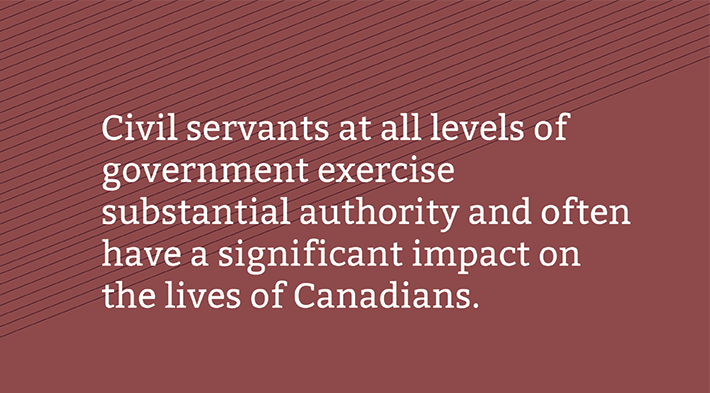February 11, 2015
When accountability in government makes the news it is often for the wrong reason — scandals, resignations, scathing auditor-general reports, or even questionable election campaign tactics.
Most often it’s government cabinet ministers or the highest-level officials that make headlines. The accountability of civil service executives, mid-level managers and professionals has been a “black box”, despite the fact that such accountability is vital to ensuring that the government, and ultimately, citizens are well-served by the public service.
Civil servants at all levels of government exercise substantial authority and often have a significant impact on the lives of Canadians. They influence how policies are developed, taxes are spent and services are delivered (e.g., advising elected officials on policy decisions; approving or denying citizenship applications; applying laws or regulations).
Ultimately, accountability isn’t just about what happens to one or another civil servant when things go wrong — although that’s obviously important — it’s also about whether day-to-day accountability practices within the civil service meet desired objectives.

What is the purpose of civil service accountability?
While there are a number of different purposes that civil service accountability can serve, among the most important are: democratic control, which ensures that while civil servants should “fearlessly advise”, they also “faithfully deliver” what the Minister decides (as long as it isn’t illegal) to preserve democratic accountability back to citizens for matters like spending or policy decisions; assurance, which ensures that decisions and behaviours align with laws, regulations and other social norms; learning, which allows for continuously improving the quality of the work of civil servants; and results, which emphasizes the importance of achieving desired policy and program objectives.
Comparing Canada to Australia and the Netherlands, we can get a sense of how well accountability works for each of these objectives. Generally, respect for democratic control and dedication to acting in accordance with laws, regulations and other norms is pretty consistent among all three countries. Civil servants look upon the idea of being held to account for democratic control and assurances as a matter of routine. In part this is due to how embedded the principles of democratic control and acting in accordance with the rules are in civil service culture. In part this is also due to how much easier technological advances like online meeting agendas that allow monitoring of who meets with whom, IT monitoring and controls over spending on contracts simplify holding individuals to account. While in some ways these technological advances have bolstered accountability by providing information for superiors to hold subordinates to account, they have also fostered some unintended consequences (e.g., electronic signoff records facilitating buck passing to whomever signs off last).
There is less evidence that the Netherlands, Australia and Canada have developed a civil service culture that encourages acknowledging and learning from mistakes to deliver better performance through accountability. Where officials in all three countries described this occurring, it was almost always associated with a particular individual, rather than with the department’s culture or the civil service as a whole. In this sense, accountability practices are not helping us to improve the performance of civil servants as much as they could be.
In Canada, we could also do a better job at using our accountability systems to drive a focus on the measurement of results. Australia has been more successful at making sure that accountability for measured results cascade from departments down through bureaucratic hierarchies to individuals deemed responsible for their achievement.
How we think about, define and emphasize the different purposes of accountability has a practical implication for how we expect civil servants to do their jobs. We should be thoughtful about what ends we expect accountability to serve, especially as technological and other changes mitigate increasingly outdated accountability concerns.
How we think about, define and emphasize the different purposes of accountability has a practical implication for how we expect civil servants to do their jobs.
In January, Mowat’s Government Transformation Practice Lead, Mark Jarvis, published an article about accountability in the Australian Journal of Public Administration.






